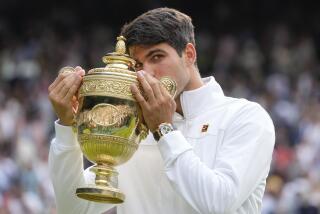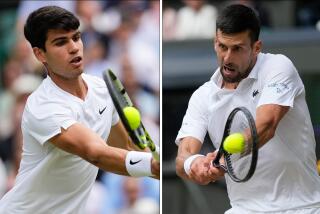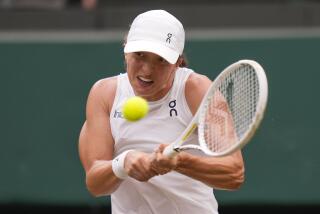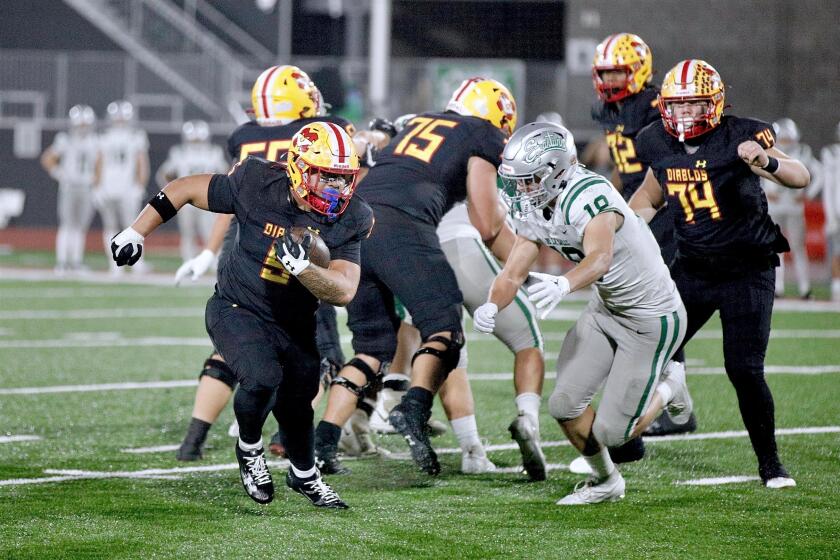Roger Federer beats Andy Roddick in nail-biter Wimbledon final
WIMBLEDON, ENGLAND — As a deathless fifth set bloated to 6-6 and to 10-10 and to an inconceivable 14-14, as it elongated to 95 minutes and left the corner scoreboard chockablock with numerals, this latest masterpiece of a Wimbledon final seemed to heave with the audacious aim of rivaling its hallowed predecessor.
Whether it succeeded in the end would prove debatable, but nobody at Centre Court on a sunny, blustery Sunday at the All England Club will lament having witnessed a men’s singles final so commendable that the fans wound up chanting the name of the man who did not win.
“Roddick! Roddick! Roddick!” they roared, because Roger Federer’s 5-7, 7-6 (6), 7-6 (5), 3-6, 16-14 nudge past Andy Roddick in the longest Grand Slam final by games had become the second straight Wimbledon final in which neither player deserved defeat, as well as an implausible case of somebody not winning despite holding serve in his first -- really, now -- 37 tries.
Crestfallen in his chair, his face aimed at the ground as their chant swelled, the 26-year-old native Nebraskan who’d lurked sorrowfully near his childhood daydream stood up, turned around and clapped for an audience that returned the standing ovation.
“Sorry, Pete,” Roddick would say moments later toward Pete Sampras in the front row of the Royal Box while holding his third and least appropriate Wimbledon runner-up plate. “I tried to hold him off.”
Did he. With an upgraded calm essential for not crumpling into a sobbing heap after a lurid second-set tiebreaker, Roddick almost thwarted Federer’s sixth Wimbledon title and his eclipsing of Sampras with a record 15th Grand Slam title. A player even tennis freaks had all but disregarded in recent years -- and whose second-round ouster last year marked his worst Wimbledon -- collaborated with Federer at least to approach the soaring 2008 final of Rafael-Nadal-over-Federer-by-9-7-in-the-fifth.
“I lost,” Roddick summarized inaccurately.
Indeed, when the 4-hour 18-minute, serve-and-return bout of staccato points had ended, Federer uttered seven words almost never heard from him in Swiss, German, French or English: “I couldn’t control the match at all.”
After he somehow withstood what he couldn’t control, the first question to a brooding Roddick went: “Did you just lose to the world’s greatest tennis player ever?”
Roddick, in a word: “Yes.”
For in addition to all the aesthetic shotmaking and the suitable power and the winner’s near-record 50 aces of Sunday, Roddick’s crowding of Federer in their third Wimbledon final together unearthed another Federer trait long buried beneath the pile: For a placid sort from the tranquil city of Basel, Switzerland, his vessels sure do carry a considerable ration of street fighter.
“You know, he was having trouble picking up my serve today for the first time ever,” Roddick said. “He just stayed the course. You know, you didn’t even get a sense that he was even really frustrated by it. . . . He gets a lot of credit for a lot of things, but not how many matches he kind of digs deep and toughs it out.”
Thirty-seven straight inabilities to break service until the 30th game of the longest closing set in men’s Grand Slam history left Federer “frustrated at times,” he said, but ultimately proudest of “just the fight, you know, because I’m famous for being all casual and relaxed out there, not showing much.”
“I have to give it to him,” Sampras said to the BBC, calling Federer “the best in my book” and saying, “Fifteen majors, that’s a lot of majors.”
The retired seven-time Wimbledon champion had landed in London on Sunday morning for a “surreal” 24-hour stay. He had turned up with his wife, Bridgette Wilson, during the first changeover, ambling down the steps to gathering applause and filling out a Royal Box that included past champions Bjorn Borg, Rod Laver and Manolo Santana. He had waved to the crowd and made Federer temporarily nervous, but not too much so to say hello from the court.
He had come for a coronation but would witness an altercation, odd for a non-rivalry in which one player has won 19 of 21 meetings. The 77 games would trump the 71 from the 1927 Australian Open final, the fifth set would trump the 11-9 of the 1927 French, and by the remarkable tiebreaker of the second set, a day about Roger had become a day about Roger-and-Andy, specifically the 2003 U.S. Open champion’s leaner, clearer play abetted by new coach Larry Stefanki.
Consistent, aggressive, probing and searing of serve as ever, just as in his upset of No. 3 Andy Murray in the semifinals, Roddick came upon four set points for a two-set lead when he put away a soft forehand volley for a 6-2 lead in the tiebreaker. Just then, though, Federer played a short-hop, cross-court backhand out of the Federer art gallery, plus a service winner and an ace for 6-5, when came a point sure to lurk cruelly in Roddick’s cranium flinging pain.
A whipped approach shipped Federer into the corner. A Federer forehand came swirling through the sky toward Roddick. Roddick cocked for a backhand volley. And . . .
“There was a pretty significant wind behind him at that side,” Roddick said. “It was gusting pretty good at that time. When he first hit it, I thought I wasn’t going to play it. Last minute, it looked like it started dropping. I couldn’t get my racket around on it. I don’t know if it would have dropped or not.”
It screamed off sickly to the right as if carried by vultures and bound for another time zone, and Federer won the tiebreaker by 8-6 and won another to go 18-3 in Grand Slam final tiebreakers, whereupon he presumed Roddick subdued.
He presumed errantly, and the donnybrook paraded on, Roddick enduring a break point at 0-1 in the fifth, Federer withstanding two crucially at 8-8, Roddick serving to stay in the match an unfathomable 10 times until his game started leaking slight oil.
So on the 436th point came a completely unfitting finale when the ball caromed from a Roddick forehand miss-hit and sprayed away. Federer would leap. The crowd would chant in what Roddick called “a nice and appreciated gesture.” And somehow, on a day supposedly about somebody else, Roddick would go about grappling with the singular pain of closeness.
Versus his other two Wimbledon final losses, he said, “I think it’s worse,” a worthy pain maybe only one guy foresaw way back on the pre-tournament Saturday of June 20, just after Nadal withdrew because of knee tendinitis and Federer listed possible contenders.
Those 16 long days ago, he coursed through some familiar names before getting to one others considered an afterthought.
“Roddick, I think, is going to be so difficult to beat again,” Federer said, proving he’s outrageously talented and occasionally prescient.
--
--
(BEGIN TEXT OF INFOBOX)
BY THE NUMBERS / ROGER FEDERER VS. ANDY RODDICK
15
Grand Slam singles titles for Federer, passing Pete Sampras’ 14 from 1990-2002.
77
Games played by Federer and Roddick, the longest men’s Grand Slam final.
50
Aces served by Federer, a personal best and one shy of the Wimbledon record.
182
Matches won by Federer in Slam events, fifth-best in Open era.
More to Read
Go beyond the scoreboard
Get the latest on L.A.'s teams in the daily Sports Report newsletter.
You may occasionally receive promotional content from the Los Angeles Times.










